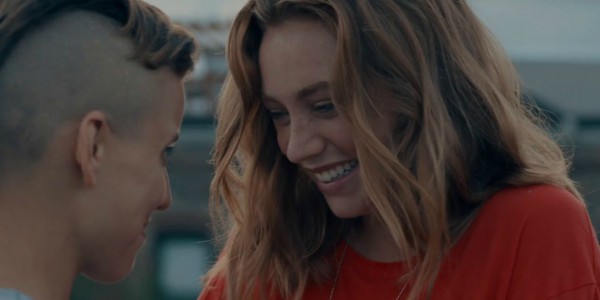PRINCESS CYD: A Quiet Masterpiece

It took me a while to discover the wonderful world…
The coming-of-age movie has been a popular genre since the 1980s (the decade of Me And Earl and The Dying Girl have received major backlash after a favourable critical reception, accused of being formulaic and cloyingly quirky, appealing to the Sundance jury but no-one else.
Despite these developments, the fact remains that the best coming-of-age movies can claim a place in our collective hearts like those from no other genre. The best coming-of-age movies make us feel more connected to each other, and provide a much-needed dose of truth and optimism to help us face the world anew. The best coming-of-age movies are like best friends; comforting but honest. You feel better for having spent time with them.
And Princess Cyd is one of the best.
Plot
Sixteen-year old Cyd (Jessie Pinnick), anxious to get away from her depressive father, decides to spend the summer with her aunt Miranda (Rebecca Spence) in Chicago. The two haven’t met since Cyd was very young, and are polar opposites; Miranda is a best-selling novelist, and Cyd, a soccer player who “[doesn’t] really read”.

As they get to know each other, the two women grow close, despite their differences. Cyd also becomes close with Katy (Malic White), a barista who is taking time before college to figure things out. Their friendship soon becomes intimate and Cyd explores feelings she’s not had before as she embarks on her first same-sex relationship.
It proves to be a summer that all three women will remember for the rest of their lives.
“Our Happiness Is Unique”
The dramatic engine of Princess Cyd is in the differences between Cyd and Miranda. Full of the bluntness of youth, though she doesn’t mean to, Cyd can often come across as rude. She exhorts her aunt to disclose the plot of her latest novel because “[she’s] not gonna read it”, she asks point blank if Miranda has sex, and she struggles to disguise her bewilderment at the fact Miranda is still living in the house where she grew up. Though the film may be delicate, she is not, and that causes her more thoughtful aunt considerable pain throughout the movie.
After a particularly tactless comment from her niece, its clear that Miranda has had enough. Spence‘s delivery of the subsequent monologue is wonderful – empathetic, but firm – as she tells Cyd that “It isn’t a handicap to be one way and not another; to like one thing, and not another… we are different shapes and ways, and our happiness is unique”.
That message of utter acceptance is one that permeates every scene, and it’s essentially what makes Princess Cyd such a special movie.

It’s seen particularly in the relationship between Cyd and Katy. Their attraction is instant, and yet never having had a same-sex relationship before, Cyd enters into things with some measure of confusion (the conversation she has with Miranda about how to have sex with Katy is amongst the movie’s most charming). Nevertheless, she faces nothing but support from everyone she comes across. Turning up at her aunt’s literary soiree in a tuxedo, she is clearly nervous, but greeted warmly. Later, in discussion with some of Miranda’s friends about their sexualities, when Cyd says “I like everything!”, there’s kind laughter. It’s hard to imagine a more accepting group of people.
Perhaps a coming out faced with so little resistance is unrealistic, but Cone‘s film is only focused on sexuality as one aspect of difference. Princess Cyd is about acceptance of those differences, whether that be of sexuality, religion or just how you like to spend your free time. Its declaration is that if we are to be accepted, we must accept others too, and that we’d all be better for it. It isn’t the first film to have this message at its centre, not by a long way, but it rare to see it delivered with such nuance.
Undramatic And Delicate
Princess Cyd begins with a 911 call, where an off-screen voice declares “We have some bodies here.” Later on, there’s an attempted sexual assault. And yet the movie remains remarkable for how undramatic it is.
Both of the aforementioned events are still given their proper weight. The 911 call is a pivotal part of Cyd’s history, and the assault (or near-assault; we only see the lead-up, and even afterwards it isn’t completely clear what happened) is treated with care and sensitivity. But these events aren’t wrung for every inch of drama, the way they might have been in the hands of a lesser talent than writer-director Stephen Cone. They simply become part of the patchwork that makes up these three different characters. You see the effects of these events in subtle ways; looks and touches.
Cone has crafted his coming-of-age movie with sympathy and specificity. He’s helped by his fantastic cast. Rebecca Spence and Jessie Pinnick are both relative unknowns, but after their performances in Princess Cyd, they surely won’t be for much longer.

Both actresses navigate the nuance of their characters with grace and precision. A few wrong turns and Miranda’s insecurities could well have become grating, but Spence imbues her character with such vulnerability that you can’t help but feel for her, especially after her niece has been casually rude.
Pinnick arguably had an even harder job inhabiting Cyd. Spence is gifted that terrific monologue and an altogether more eloquent personality. The screenplay doesn’t grant Cyd so many chances to explain herself. You sense the change she undergoes throughout the film through the expressions on her face; at the film’s opening she’s rather blank, but as each new understanding hits, her eyes become more alive and you can see what she’s thinking. Whilst Miranda stays largely the same throughout the movie, Cyd undergoes a subtle transformation, and Pinnick‘s finely-drawn portrayal of this is wonderful to watch.
Not one element of Princess Cyd could be accused of being melodramatic or over-emotional. There are no extravagant set-pieces underlined by a swelling score. Yet by the time the film draws to a close, it still feels as if you’ve been through the emotional wringer. Cone marries his specific characters to his wider message of acceptance, without making the film feel didactic or preachy. It may be a small movie, but that achievement is enormous.
Princess Cyd: In Conclusion
Princess Cyd is a low-key marvel; an elegant, warm-hearted examination of the ways that we relate to one another whilst dealing with our differences. Finely observed performances from Rebecca Spence and Jessie Pinnick, together with Stephen Cone‘s richly empathetic screenplay create a movie that everyone could benefit from watching. A quiet masterpiece.
Have you seen Princess Cyd? What did you think?
Princess Cyd is out now in the US. For further release information, click here.
https://www.youtube.com/watch?v=Z2kNUMAE-jI
Does content like this matter to you?
Become a Member and support film journalism. Unlock access to all of Film Inquiry`s great articles. Join a community of like-minded readers who are passionate about cinema - get access to our private members Network, give back to independent filmmakers, and more.
It took me a while to discover the wonderful world of cinema, but once I did, everything just fell into place.













